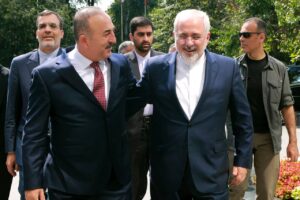
Iran and Turkey, of course, also have a long history of dealing with each other as powerful states of comparable strength – states whose rivalry in centuries past enabled the encroachment into the Ottoman and Persian empires by Western powers and Russia. The allegation by many Turkish officials that the U.S. may have played a role in the failed putsch against Mr. Erdogan – a coup attempt immediately condemned by Tehran – helped make Iran’s anti-Western stance more palatable in Ankara. (…) Both governments also subscribe, to a different degree, to notions of political Islam. Mr. Erdogan’s ruling party draws its roots from the Muslim Brotherhood, a Sunni group originally created in Egypt that wasn’t particularly hostile to the Iranian regime until the Syrian conflict erupted in 2011. Iranian Supreme Leader Ayatollah Ali Khamenei, after all, once personally translated into Persian the books of the Brotherhood’s seminal ideologue Sayyid Qutb. Such a complex shared history means that Turkey doesn’t view Iran through the same sectarian prism as Saudi Arabia and other Sunni Arab monarchies.“






